
Quick Verdict: Semrush vs Ahrefs in 2026
After testing both tools across 50+ client campaigns since 2019, here's my take: Choose Semrush if you need an all-in-one digital marketing suite with content marketing, PPC, and social media tools. Choose Ahrefs if backlink analysis and competitor research are your primary focus—its link database is unmatched.
- Best for Beginners: Ahrefs (cleaner interface)
- Best for Content Marketing: Semrush (Topic Research + SEO Writing Assistant)
- Best Backlink Database: Ahrefs (500M referring domains)
- Best Keyword Database: Semrush (27.3B keywords, 3.7B for USA alone)
- Best Value: Ahrefs Starter at $29/month for solo users
- Best for Agencies: Semrush Business at $499.95/month (API access included)
Now, let's dive into the detailed comparison.
Semrush vs Ahrefs: The 2026 Market Reality
According to 6sense's 2026 market analysis, Ahrefs holds a 14.83% market share in the SEO/SEM category, while Semrush captures 6.68%. However, raw market share doesn't tell the whole story.
Semrush has grown to over 10 million users globally, though 89% use the free plan. The platform serves approximately 117,000 paying customers. Meanwhile, over 54,215 companies actively use Ahrefs compared to 24,854 for Semrush—a 2:1 ratio in enterprise adoption.
These tools have become the backbone of professional SEO. Their unique approaches have shaped digital campaigns worldwide, and understanding their differences can save you thousands of dollars in subscriptions and countless hours in workflow optimization.
What is Semrush?
Semrush is a comprehensive digital marketing platform that extends far beyond traditional SEO. While it started as a keyword research tool in 2008, it has evolved into an all-in-one marketing suite covering SEO, PPC, content marketing, social media management, and competitive intelligence.
The platform's database now includes 43 trillion backlinks from 390 million referring domains and 27.3 billion keywords across 142 geographic locations. For the USA alone, Semrush tracks 3.7 billion keywords—the largest USA keyword database among SEO tools.

What sets Semrush apart is its breadth. Beyond SEO, it provides tools for managing Google Ads campaigns, planning content strategies with AI-powered suggestions, scheduling social media posts, and generating white-label client reports. For agencies juggling multiple marketing channels, this consolidation can replace 3-4 separate subscriptions.
The 2026 update introduced Semrush One, their AI-era platform that tracks brand visibility across AI assistants like ChatGPT, Perplexity, and Google Gemini—addressing the growing concern of AI-driven search traffic.
What is Ahrefs?
Ahrefs is a specialized SEO toolkit laser-focused on backlink analysis, keyword research, and competitive intelligence. Founded in 2010, it has built arguably the most comprehensive backlink index on the web—35 trillion backlinks from 500 million referring domains.
The platform's crawler, AhrefsBot, is the second most active web crawler after Googlebot, processing approximately 8 billion pages daily. This aggressive crawling means fresher backlink data—often discovering new links days before competitors.
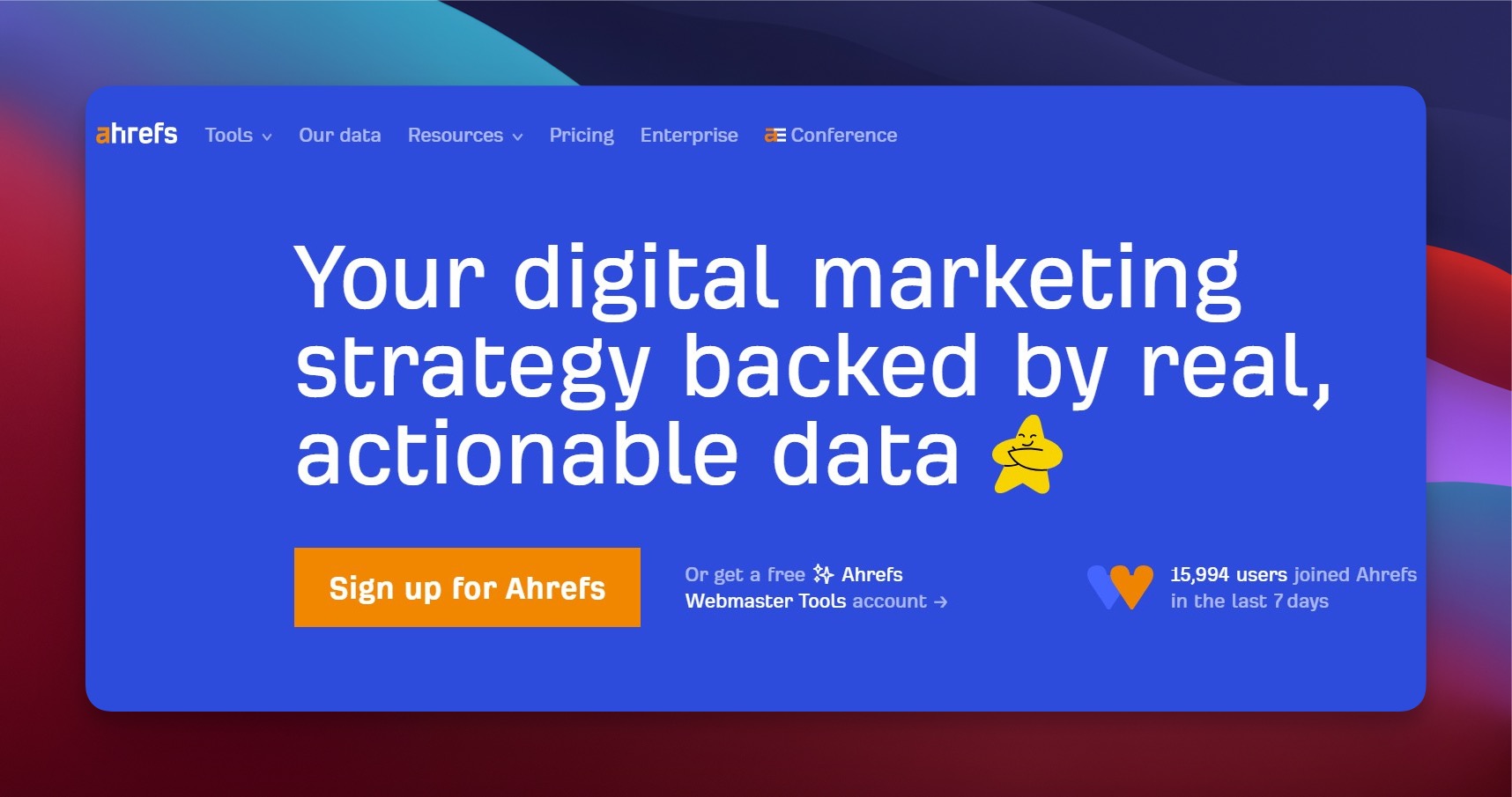
Ahrefs' strength lies in simplicity and depth within its focus area. The Site Explorer tool provides the most detailed backlink analysis available, while Keywords Explorer offers unique metrics like 'Clicks' data—showing not just search volume, but actual click behavior and whether clicks go to organic results or SERP features.
In my experience, Ahrefs excels when you need to deep-dive into a single domain's link profile or uncover content gaps that competitors are exploiting. It's the tool I reach for when building link-building campaigns.
Why This Comparison Matters in 2026
The SEO tool landscape has shifted dramatically. According to Search Logistics, Semrush reached $105 million in Q1 2025 revenue alone—breaking the $100 million quarterly mark for the first time. Ahrefs reportedly generated $149.1 million for all of 2024. Both companies are investing heavily in AI features, making the choice between them more consequential than ever.
Understanding their strengths and weaknesses isn't just academic—it directly impacts your SEO efficiency. I've seen agencies waste $10,000+ annually on the wrong tool simply because they didn't match their workflow to the platform's strengths.
The decision isn't about crowning a universal winner. It's about understanding which tool aligns with your specific workflow, team size, and marketing focus.
Semrush vs Ahrefs: Comparing 7 Key Factors
Rather than declaring an absolute winner, let's examine each tool's performance across the metrics that actually matter for day-to-day SEO work.
1. Keyword Research
My years in digital marketing have reinforced one truth: effective keyword research remains the foundation of successful SEO campaigns.
Semrush's Keyword Magic Tool lives up to its name. With access to 27.3 billion keywords across 142 locations—including 3.7 billion for the USA alone—it consistently surfaces long-tail opportunities that smaller databases miss. The keyword grouping feature automatically clusters related terms, saving hours of manual organization.
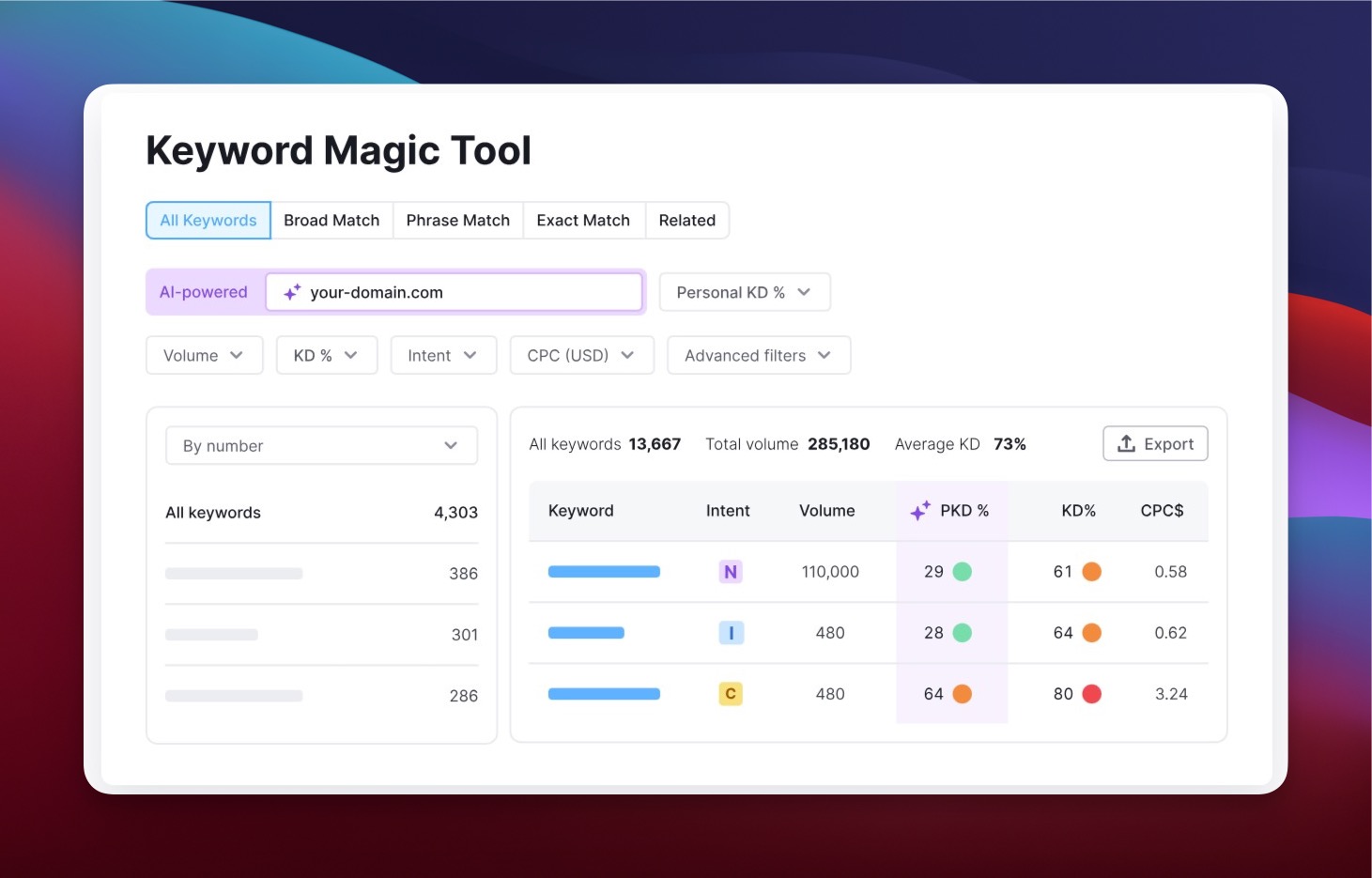
The Keyword Magic Tool excels at running targeted campaigns where you need to identify content clusters. The advanced filters for keyword difficulty, intent, and SERP features are unmatched.
However, Semrush's data density can overwhelm newcomers. The interface assumes familiarity with SEO concepts, which creates a steeper learning curve.
Ahrefs takes a different approach. The Keywords Explorer emphasizes clarity over comprehensiveness. Its standout feature is the 'Clicks' metric—showing not just how many people search for a term, but how many actually click on results. For queries dominated by featured snippets or 'People Also Ask' boxes, this insight is invaluable.
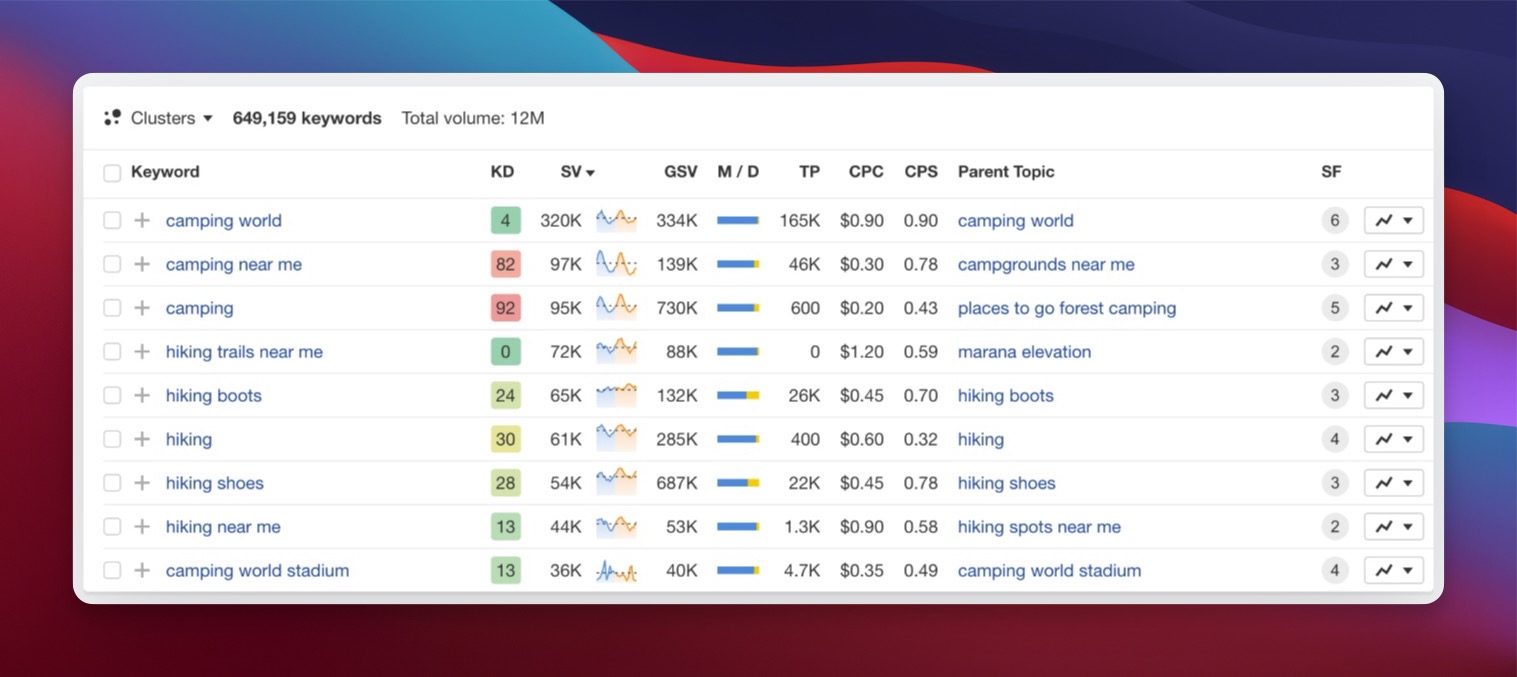
Ahrefs' interface feels more intuitive for beginners while still providing the depth that experienced SEOs need. The Parent Topic feature helps identify the main topic a page could rank for, streamlining content planning.
Verdict: Use Semrush for comprehensive keyword research and content clustering. Choose Ahrefs when you need quick, actionable insights with superior click data.
2. Backlink Analysis
Understanding and evaluating backlink profiles remains critical for any SEO campaign. This is where Ahrefs has historically dominated—and the 2026 data confirms that dominance continues.
Ahrefs maintains the industry's largest index of referring domains at 500 million, compared to Semrush's 390 million. However, Semrush leads in raw backlink count with 43 trillion links versus Ahrefs' 35 trillion.
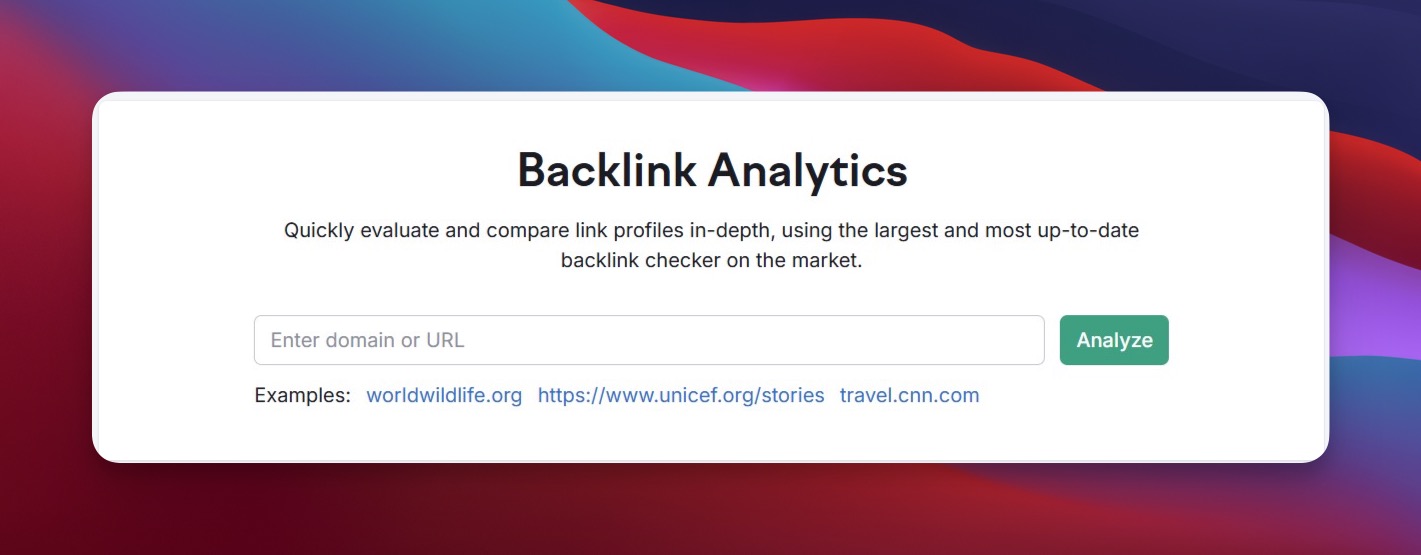
The Semrush Backlink Analytics tool provides thorough domain analysis with a focus on identifying toxic links. The Backlink Audit feature integrates with Google Search Console, creating a streamlined workflow for disavowing harmful links.
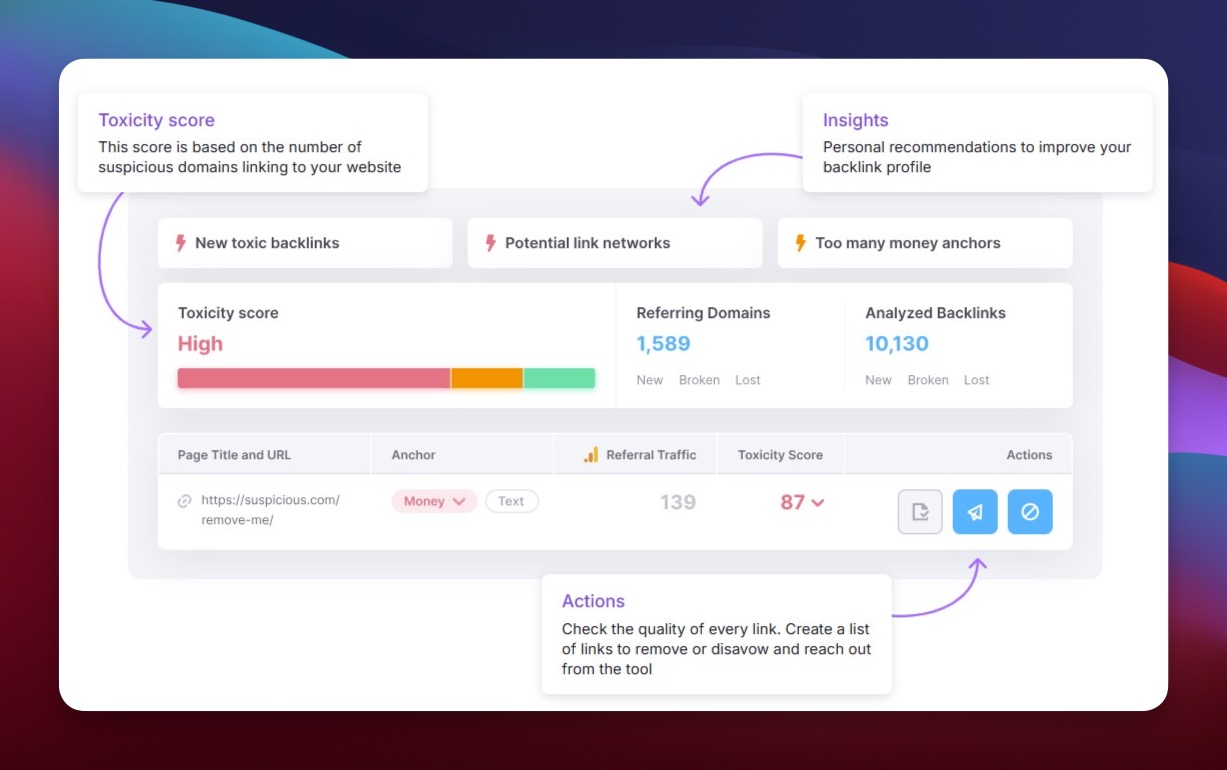
Ahrefs' Site Explorer remains the gold standard for competitor backlink research. The Link Intersect tool quickly identifies sites linking to multiple competitors but not to you—revealing immediate outreach opportunities.
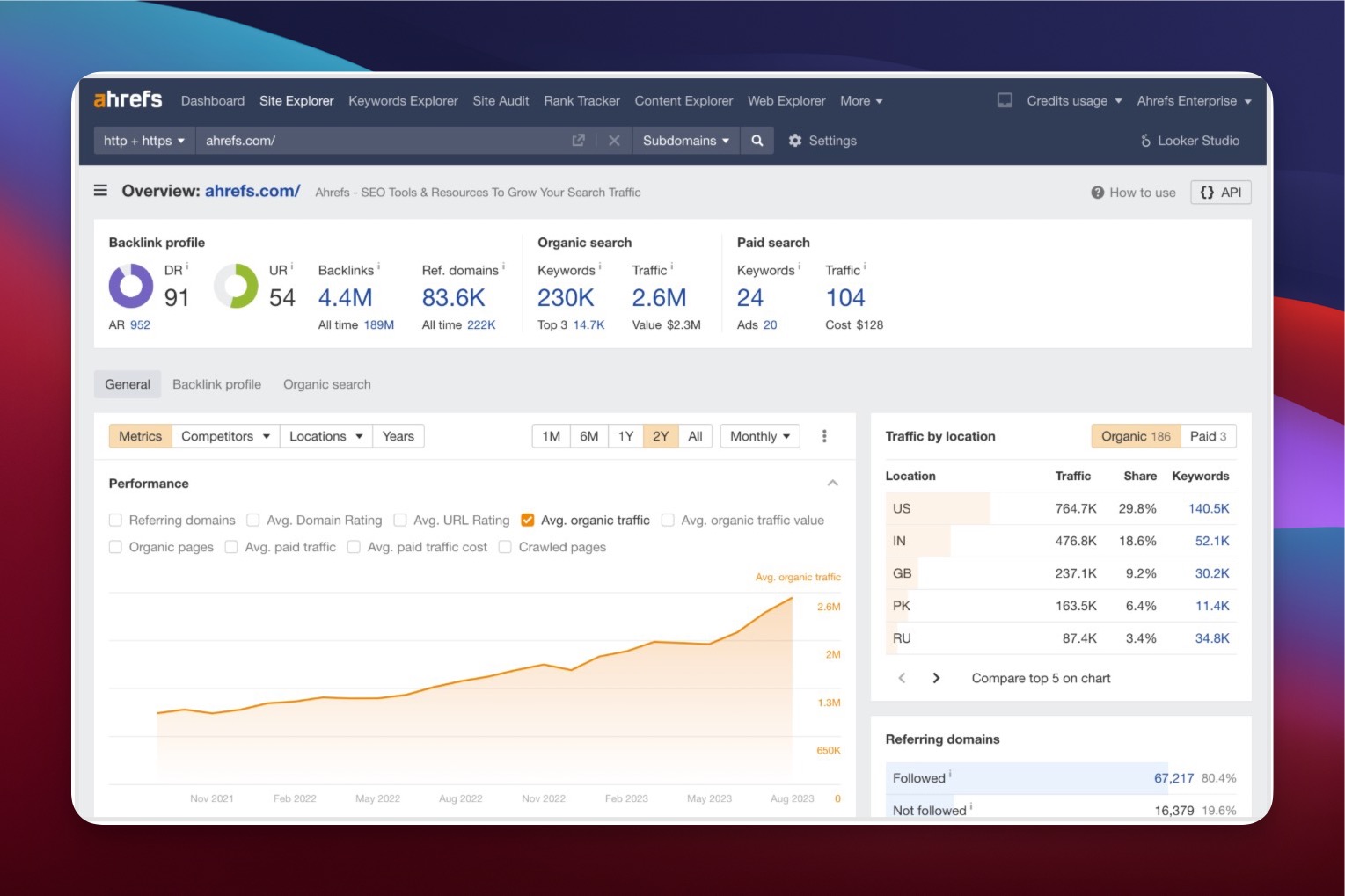
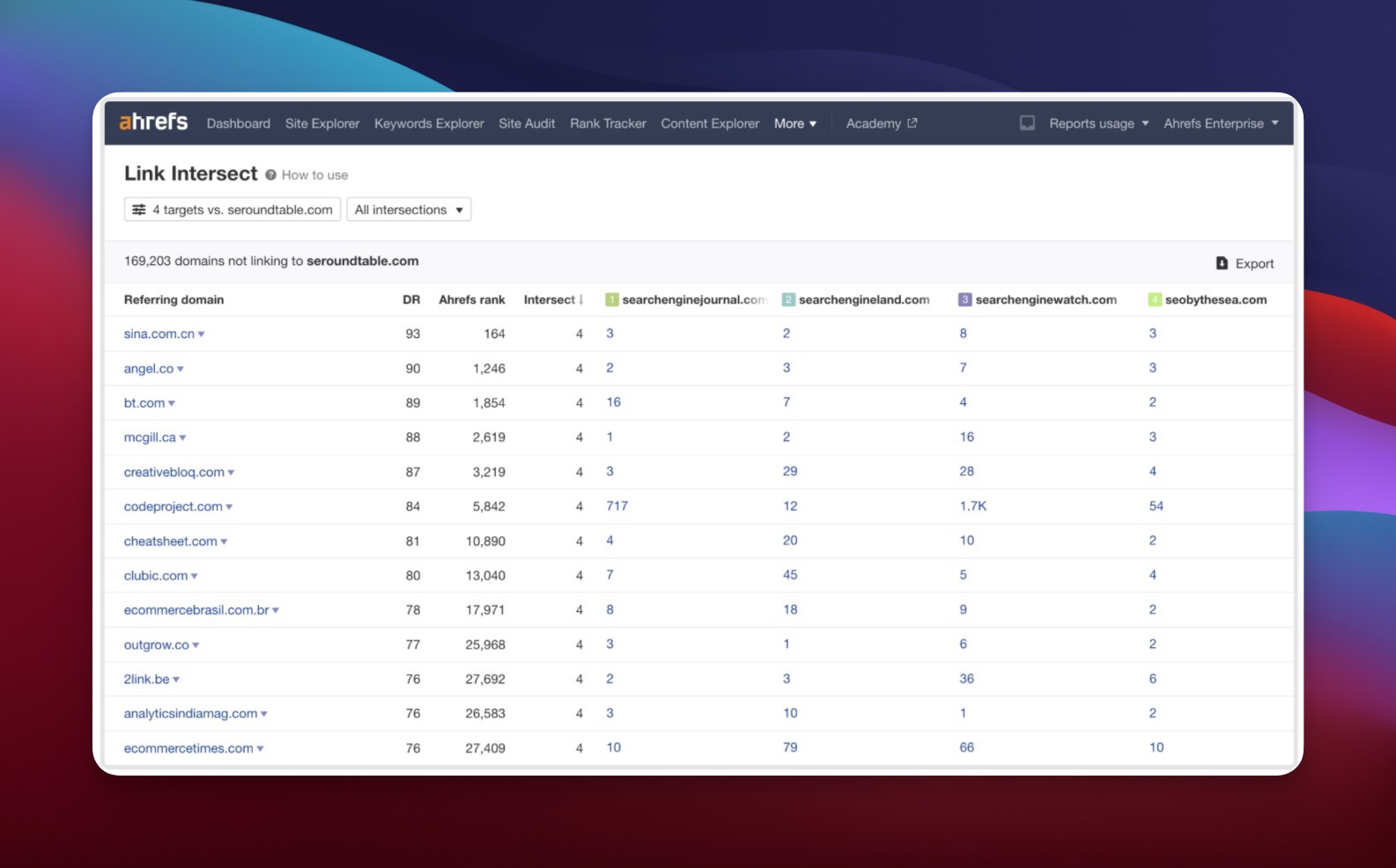
Verdict: Ahrefs leads for pure backlink analysis with its larger referring domain index. Semrush wins for integrated link auditing and toxic link identification workflows.
3. Site Audit
Technical SEO auditing is where both tools have invested heavily in 2025-2026, adding AI-powered recommendations and Core Web Vitals monitoring.
The Semrush Site Audit tool categorizes issues into Errors, Warnings, and Notices. What distinguishes it is the 'Thematic Reports' feature—organizing issues by crawlability, HTTPS implementation, Core Web Vitals, and internal linking. For large sites with complex technical debt, this organization is essential.
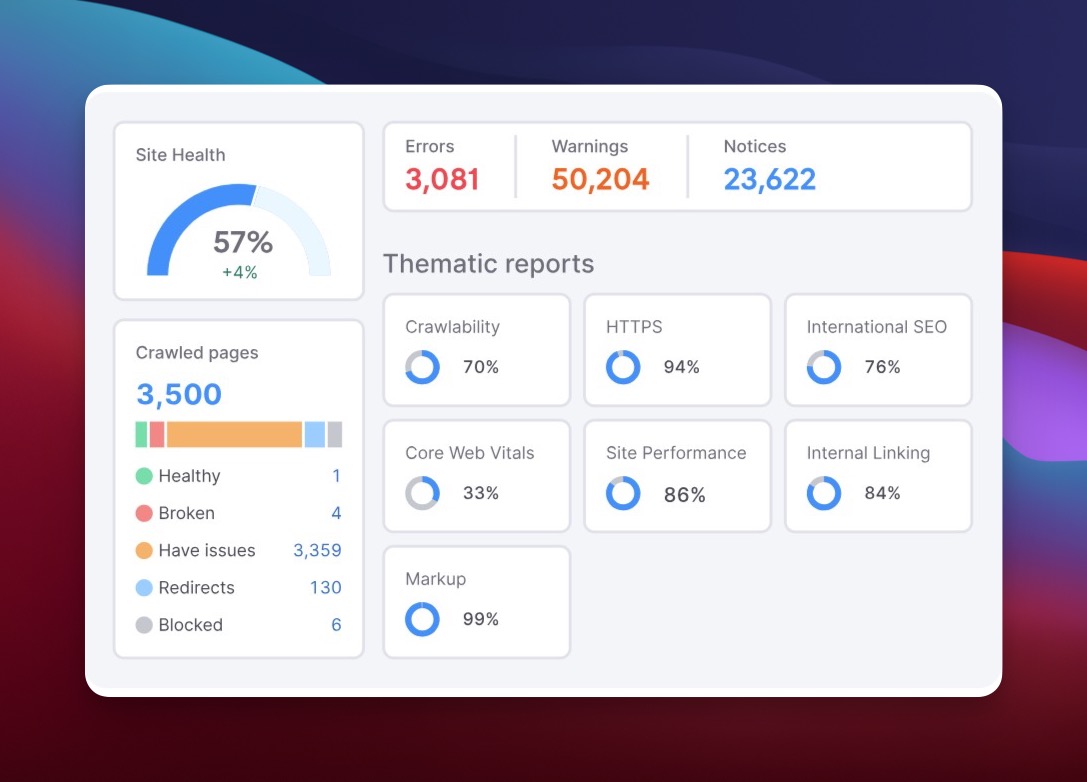
Semrush also provides actionable fix recommendations and tracks issues over time, showing whether your technical improvements are working.
The Ahrefs Site Audit takes a cleaner approach with intuitive data visualization. The health score is prominently displayed, and issues are presented in a more digestible format for those new to technical SEO.
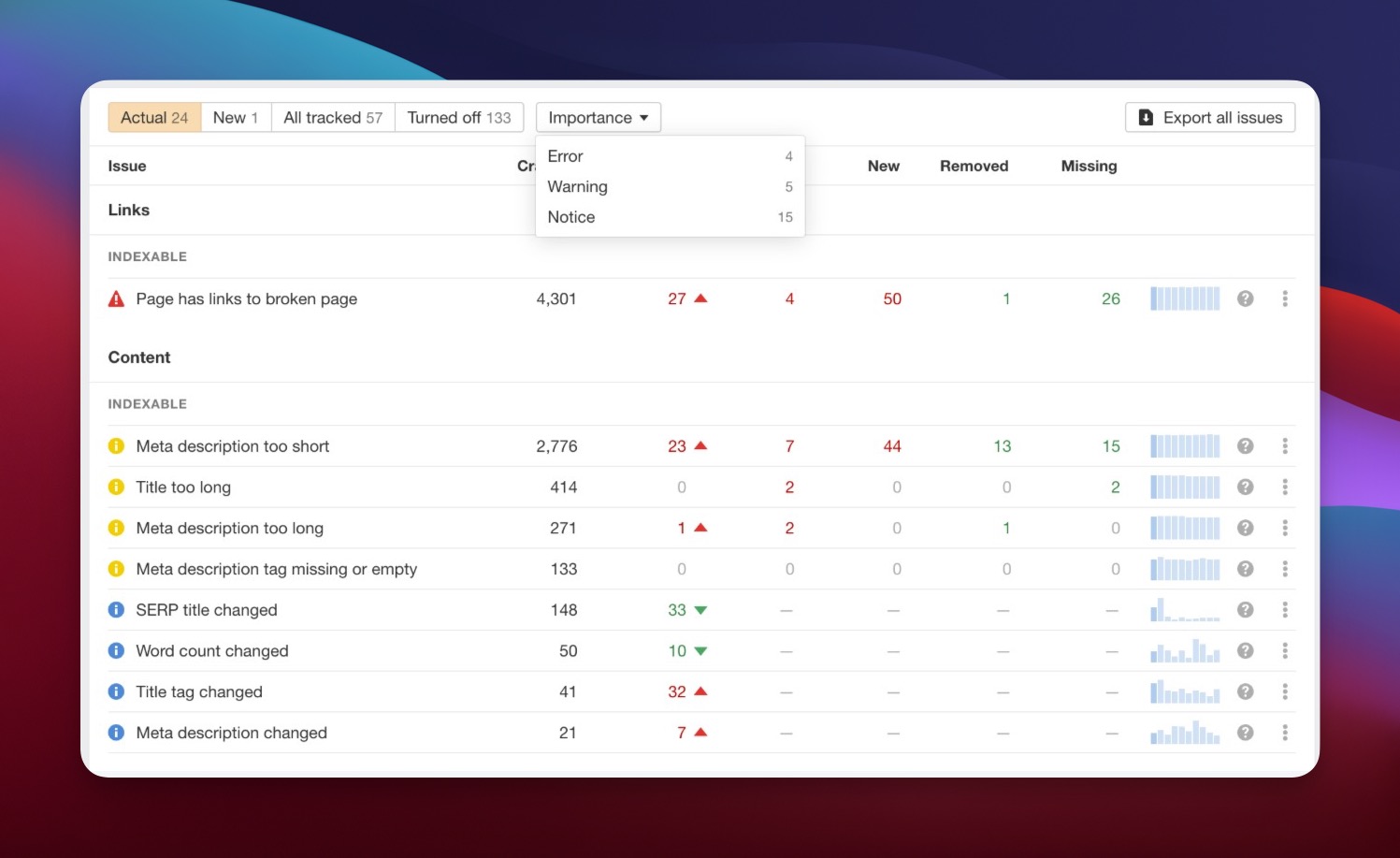
Verdict: Semrush for enterprise-level technical audits with detailed categorization. Ahrefs for quick, visually clear audits that are easier to explain to clients or stakeholders.
4. Rank Tracking
Despite arguments that traffic and conversions matter more, keyword ranking remains a critical metric for demonstrating SEO progress to stakeholders.
The Semrush Position Tracking tool excels at granular location tracking—down to the city level. For local SEO campaigns or multi-location businesses, this capability is indispensable.
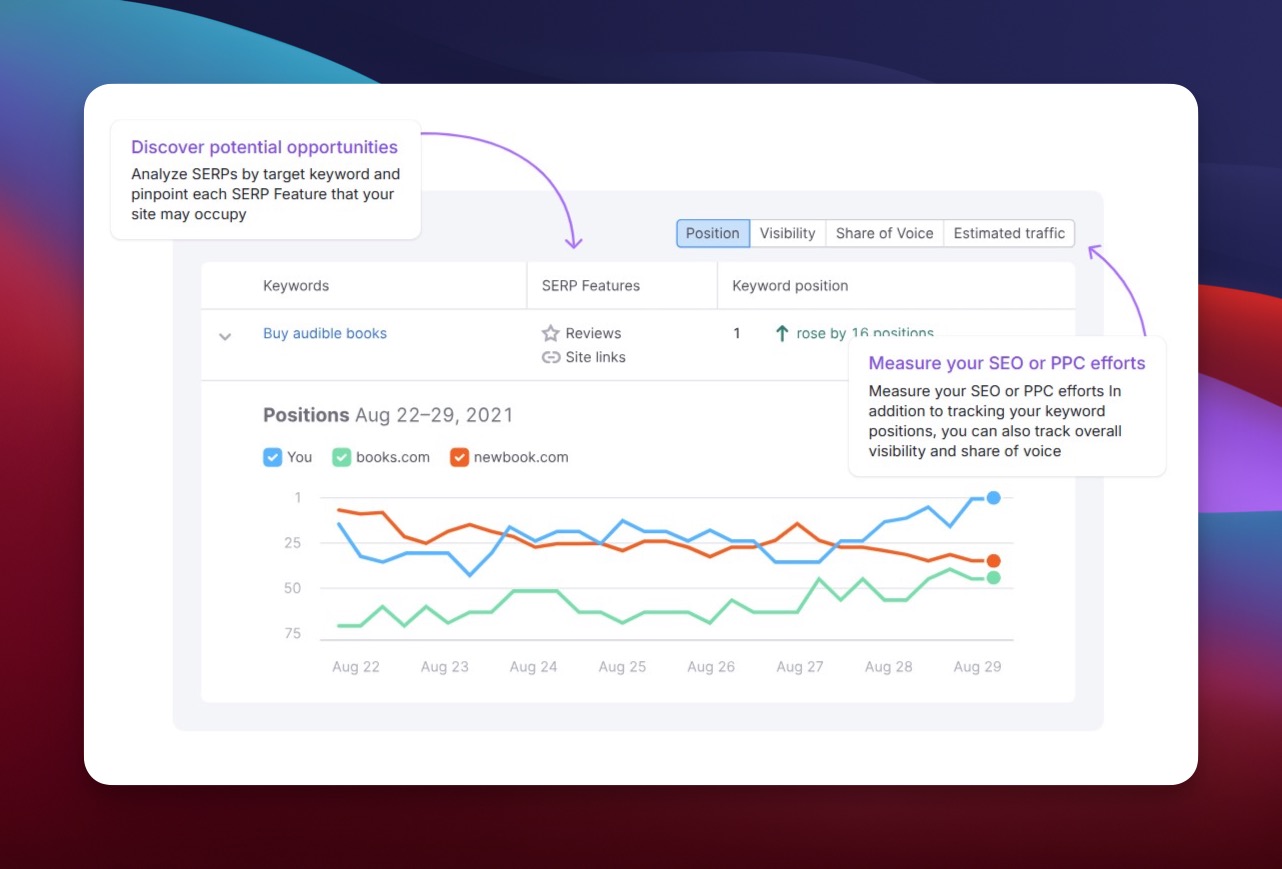
Semrush provides visibility scores, estimated CTR, and competitor ranking comparisons—all in one dashboard. However, mobile data visualization could be more intuitive.
The Ahrefs Rank Tracker separates desktop and mobile data with clear visibility graphs on the main dashboard. Email alerts for ranking changes help you respond quickly to volatility.
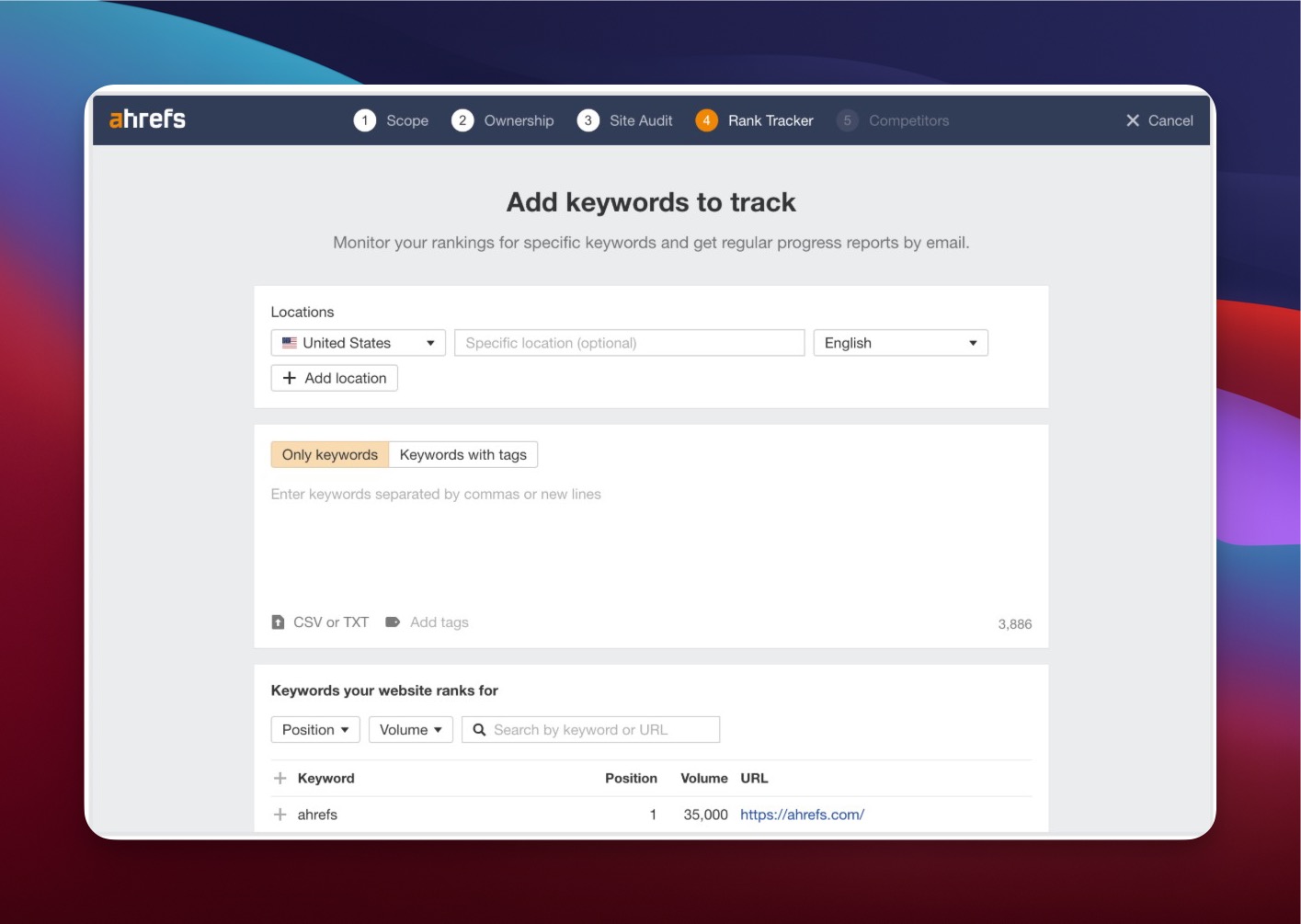
Ahrefs' limitation is the lack of city-level tracking—a significant gap for local SEO practitioners.
Verdict: Semrush for local SEO and multi-location tracking. Ahrefs for cleaner mobile/desktop visualization and quick ranking updates.
5. Unique Features
Beyond core SEO functionality, both platforms offer distinctive capabilities that can justify their subscription costs.
Semrush's Topic Research tool generates content ideas based on real questions people ask, trending subtopics, and related headlines. The SEO Content Template provides a brief with target word count, readability score, and suggested backlink sources—essentially a content strategist in a tool.
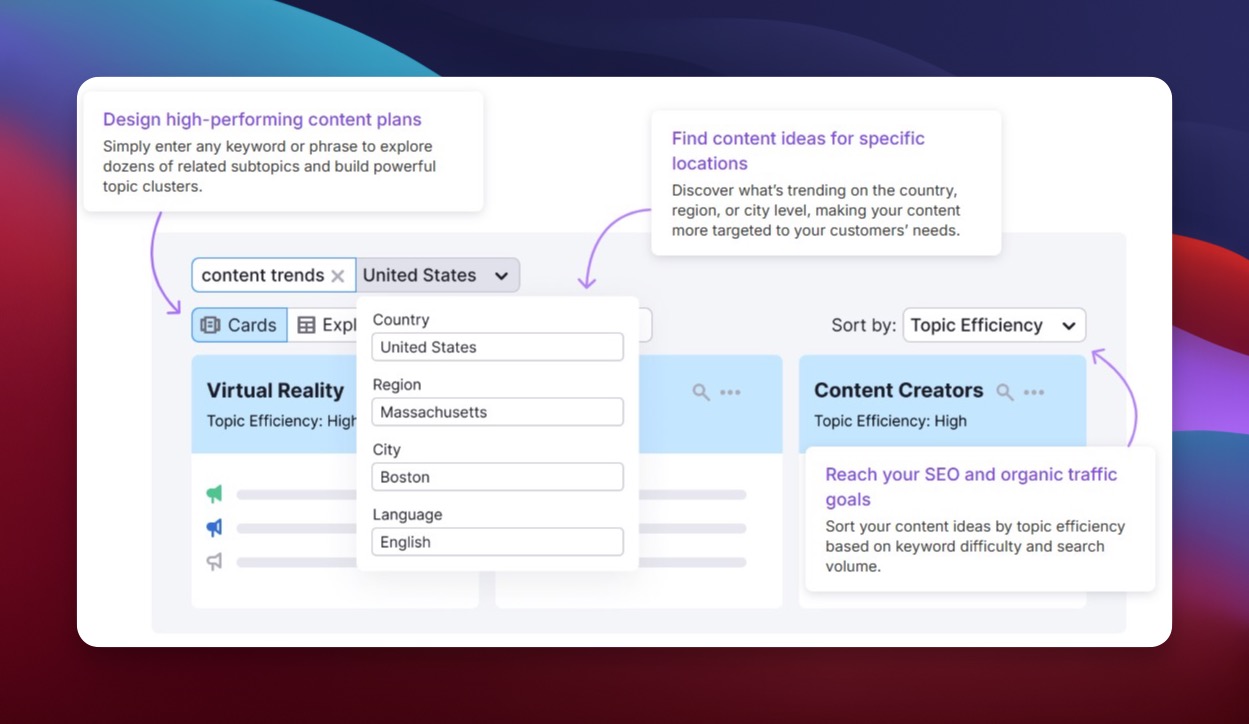
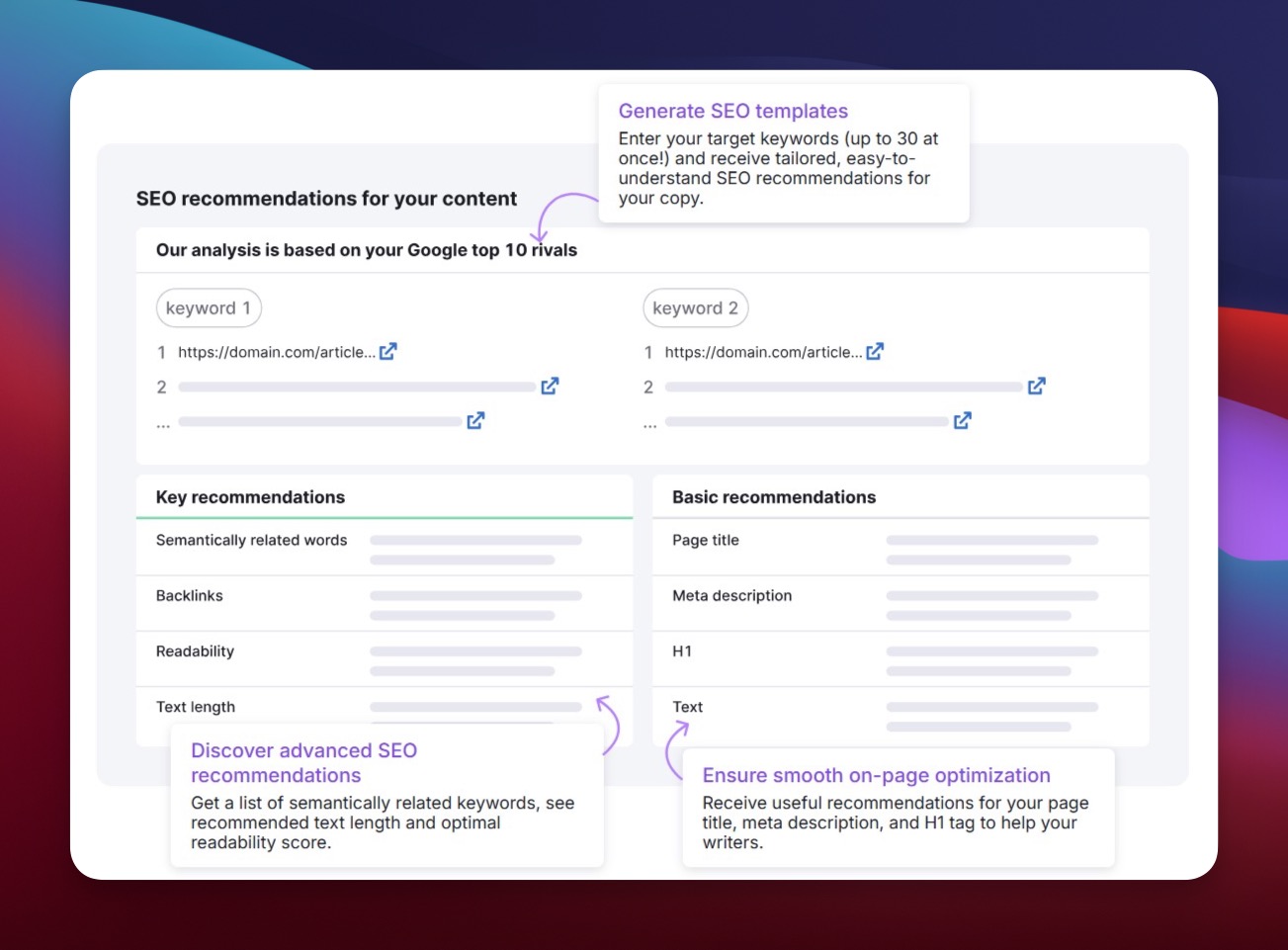
The new Semrush One platform also includes AI Visibility tracking—monitoring how often your brand appears in AI-generated responses from ChatGPT, Perplexity, and Gemini. As AI search grows, this becomes increasingly valuable.
Ahrefs counters with practical utilities. The SEO Toolbar browser extension displays key metrics while you browse, eliminating the need to switch between tabs. The free Broken Link Checker helps identify link building opportunities through broken link outreach.
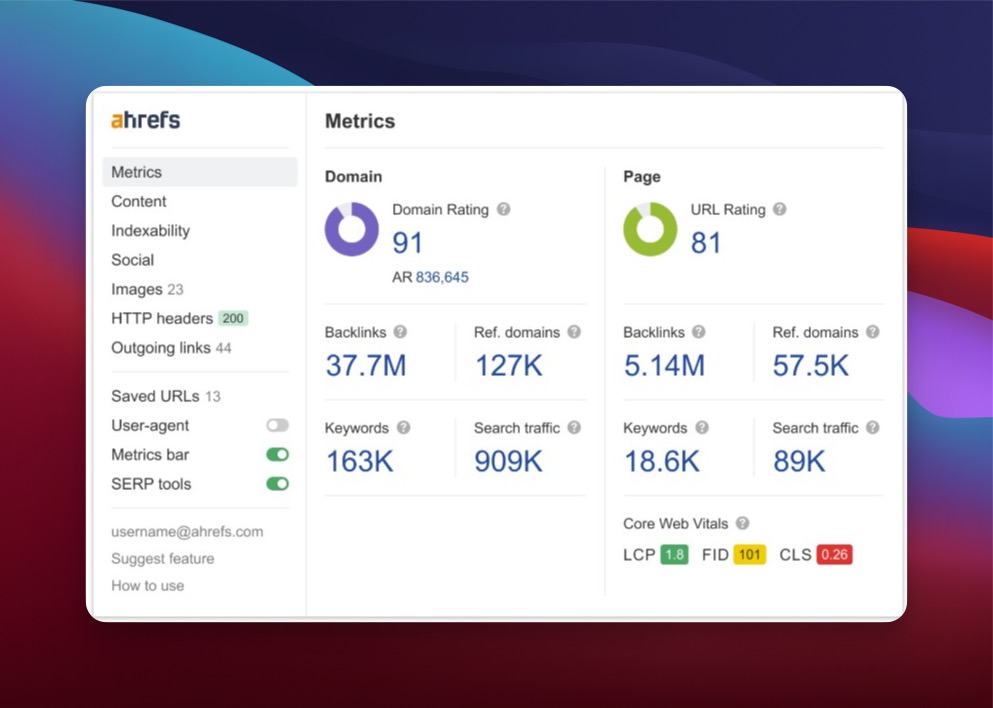
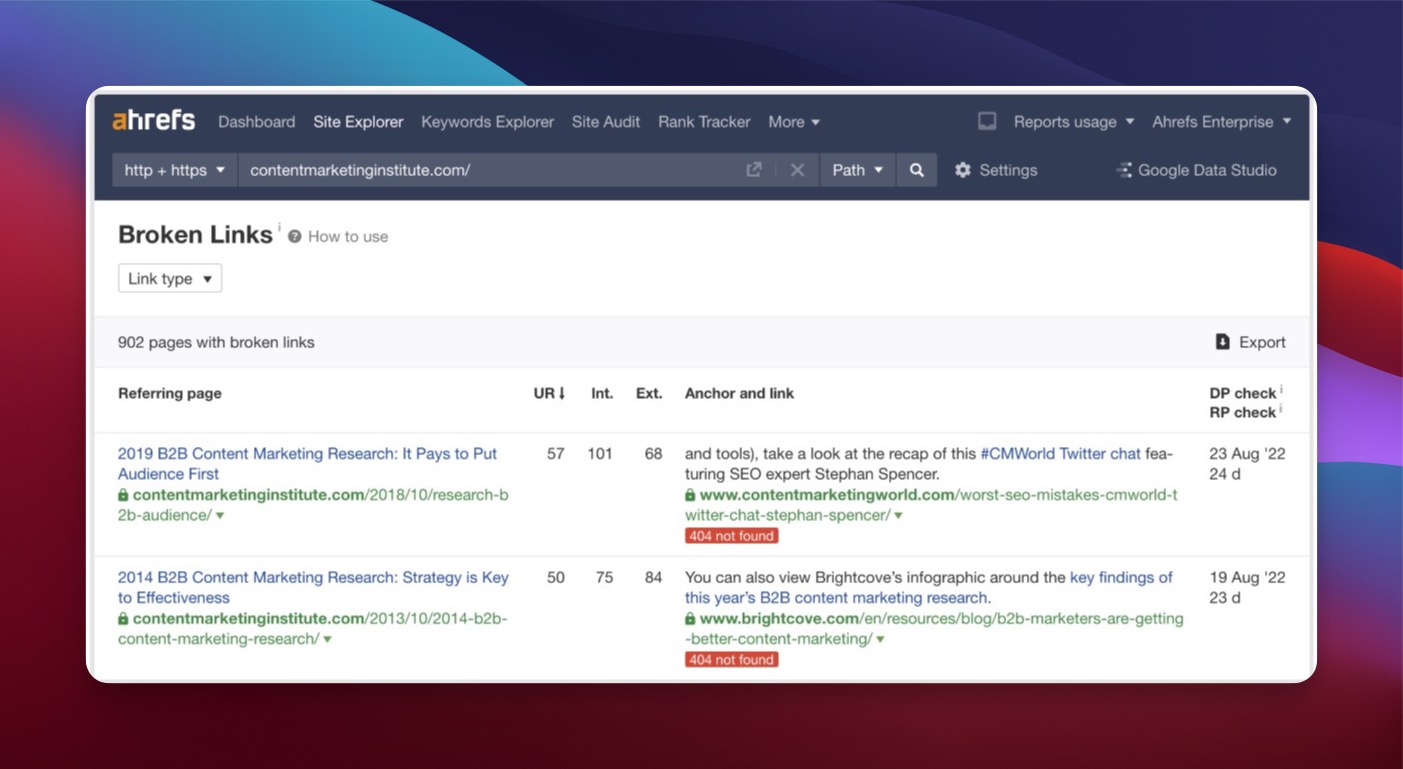
Verdict: Semrush for content marketers needing ideation and optimization tools. Ahrefs for link builders wanting quick, practical utilities.
6. Pricing (Updated January 2026)
Pricing models have evolved significantly. Here's the current breakdown based on Semrush's official pricing and Ahrefs' plans page:
Semrush Pricing (2026):
- Pro: $139.95/month ($117.33/month annually) — 5 projects, 500 keywords
- Guru: $249.95/month ($208.33/month annually) — 15 projects, 1,500 keywords, historical data
- Business: $499.95/month ($416.66/month annually) — 40 projects, 5,000 keywords, API access
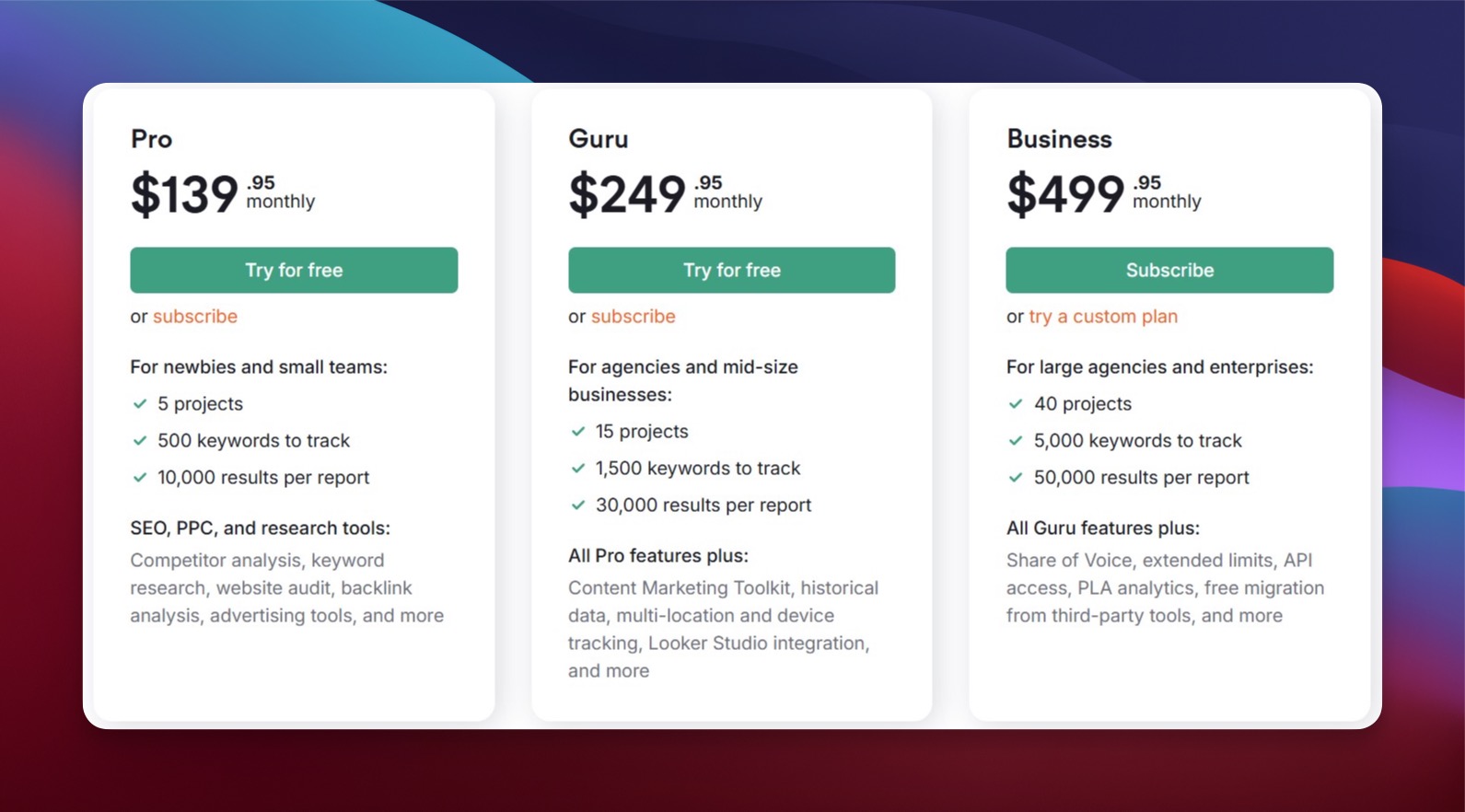
Add-ons include Local SEO ($30/mo), Social Media ($20/mo), and Content Toolkit ($60/mo). The new AI SEO Toolkit starts at $99/month per domain.
Ahrefs Pricing (2026):
- Starter: $29/month — 1 project (new affordable tier)
- Lite: $129/month — 5 projects, 750 keywords, 6 months history
- Standard: $249/month — 20 projects, enhanced limits
- Advanced: $449/month — 50 projects, extensive crawling
- Enterprise: $1,499/month — 100 projects, full access
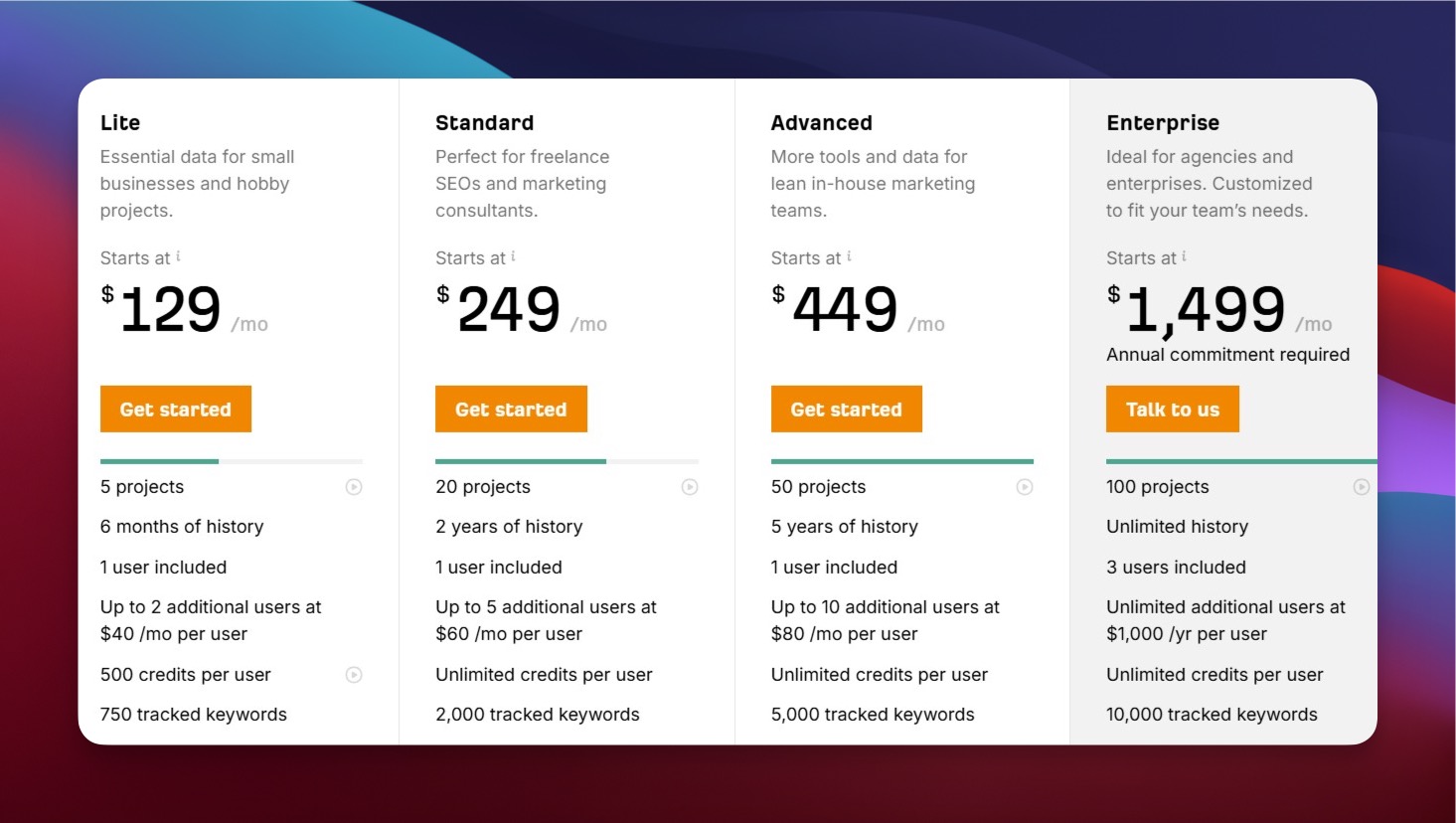
Ahrefs' new $29 Starter tier makes it accessible to solo freelancers and small projects—something Semrush doesn't match.
Verdict: Ahrefs offers better value at the entry level ($29 Starter). Semrush provides more features per dollar at mid-tier and above, especially with content marketing tools included.
7. AI Features (New for 2026)
Both platforms have embraced AI capabilities, though with different focuses.
Semrush's AI integration is more comprehensive. The Semrush One platform includes AI Visibility tracking, monitoring brand mentions across major AI assistants. The ContentShake AI tool generates full article drafts based on your target keywords and competitor analysis.
Ahrefs has been more conservative with AI, focusing on AI-assisted content gap analysis and predictive keyword difficulty scoring. Their AI Writing Tools beta helps generate meta descriptions and title tag variations.
Verdict: Semrush leads in AI integration and visibility tracking. Ahrefs takes a more measured approach, focusing on AI-enhanced existing features rather than new AI products.
SEOmator: A Cost-Effective Alternative
For teams seeking comprehensive SEO capabilities without enterprise pricing, SEOmator offers a compelling middle ground. The platform matches core features of both Ahrefs and Semrush—including backlink analysis, keyword research, and technical site audits—while providing additional functionalities at a fraction of the cost.
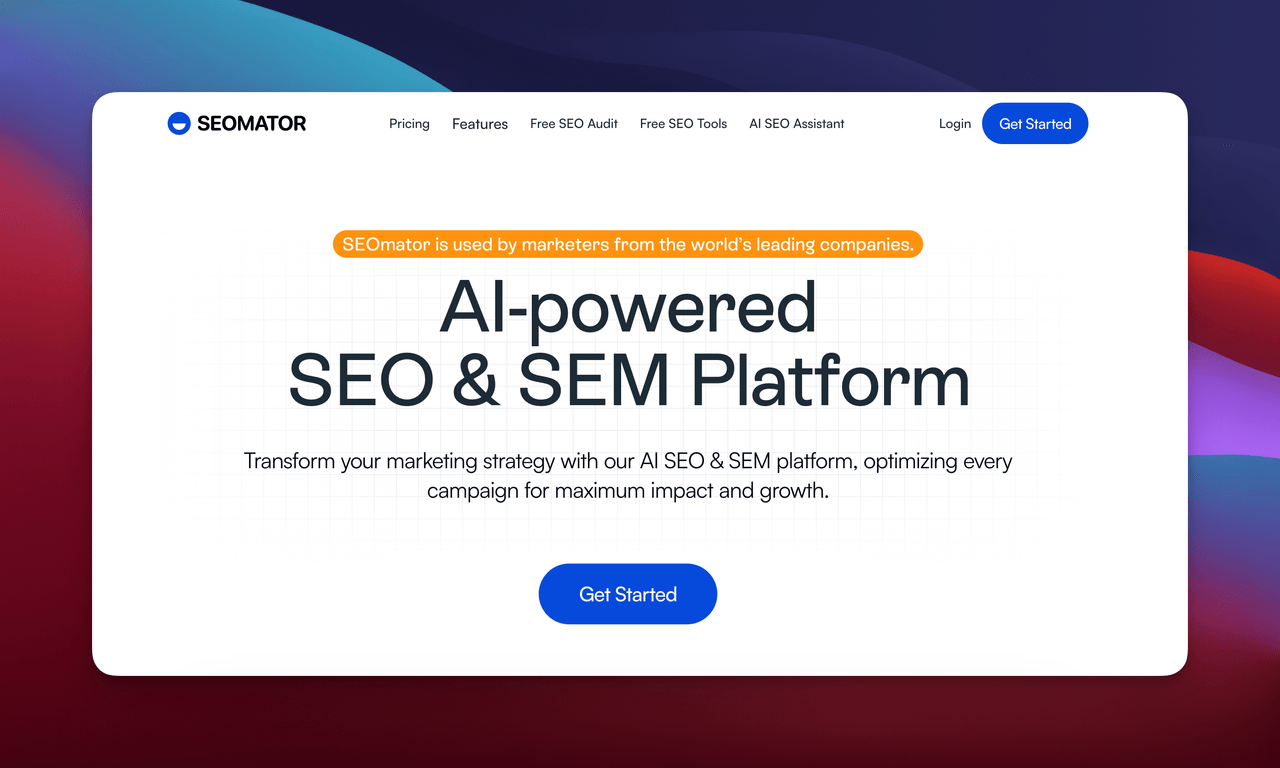
SEOmator's white-label reporting and agency features make it particularly valuable for SEO consultants who need client-facing tools without the premium price tag. Whether you're focused on technical audits, competitive analysis, or content optimization, SEOmator can complement or replace more expensive alternatives.
Final Recommendation: Which Should You Choose?
After years of using both tools across dozens of client campaigns, here's my recommendation matrix:
Choose Semrush if you:
- Need an all-in-one marketing platform (SEO + PPC + Social + Content)
- Run content marketing campaigns and need ideation tools
- Require local SEO tracking at the city level
- Want to track AI visibility for your brand
- Are an agency needing API access and white-label reporting
Choose Ahrefs if you:
- Focus primarily on backlink analysis and link building
- Prefer a cleaner, more intuitive interface
- Need the largest referring domain database
- Are a freelancer or solo consultant on a budget ($29 Starter)
- Want practical browser extensions for quick analysis
For most professional SEOs, having access to both tools provides the most comprehensive toolkit. Many agencies maintain a Semrush subscription for content and PPC work while keeping Ahrefs for deep backlink research. If budget allows only one, match your choice to your primary workflow.
The best tool is the one you'll actually use effectively—not necessarily the one with the longest feature list.
Conclusion
Both Ahrefs and Semrush have earned their positions as industry-leading SEO platforms. With Ahrefs processing 8 billion pages daily and Semrush serving over 10 million users, you can't go wrong with either choice from a data quality perspective.
The decision comes down to your specific needs: Semrush for breadth across digital marketing channels, Ahrefs for depth in backlink analysis and a more streamlined experience. And don't overlook alternatives like SEOmator that deliver professional-grade features without enterprise pricing.
Test both with their trial periods before committing. Your workflow, team size, and primary SEO focus should drive the decision—not marketing claims or feature checklists.
Related Articles:





